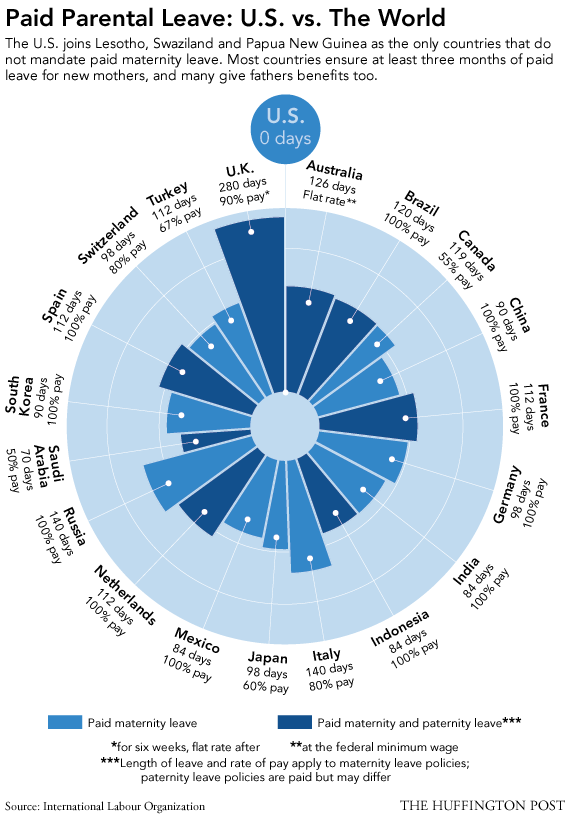
I don’t care what people say about President Obama; I think he’s so nice. Instead of asking pesky Congress—the representatives of we, the people—a third time to pass a law giving all federal employees six weeks of paid paternity leave, he just decided to bypass them and sign a presidential memorandum to accomplish this. So if you’re looking for additional paid time off, courtesy of we the generous taxpayers, join our bursting bureaucracy of oh, approximately 2.1 million employees.
Baby leave is a hot-button issue. Obama went on to push for national mandatory leave policies in his State of the Union address yesterday. At a recent formal dinner, I sat across from a lovely and articulate expatriate who readily disclosed in the first few minutes that she was born in India, and had formed a family and occupation she was thrilled with here in the United States. But that this country was basically doing it all wrong, especially in regards to maternity and paternity leave—a subject she then ranted about for a solid 20 minutes. (It occurred to me to ask why she continued to live, work, and play here but, alas, I kept my fork moving and my mouth shut.)
Comparatively Low U.S. Maternity and Paternity Leave Offerings
Nationwide, people are bemoaning how behind and backward we are on this issue. The Huffington Post whines we are the “only industrialized nation not to mandate paid leave for mothers of newborns. Most of the rest of the world has paid maternity leave policies” except for us, stupid, lame United States. In fact we join the likes of Swaziland, Papua New Guinea, and Lesotho (no offense, tiny, non-descript countries) in our backward-ness.
According to this nifty infographic on both maternal and paternal leaves (and for more info see here), the United Kingdom leads the way (in terms of pure time) offering both leave for 280 days at 90 percent pay, with Saudi Arabia, coming in dead last, with 70 days at 50 percent pay. (Okay, really? Saudi Arabia and not us? That statistic did make me squirm a little. But only 15 percent of the Saudi Arabia workforce is women, compared to 47 percent in the United States, so it costs their employers a lot less.)

NPR reported this summer that a mere 10 to 15 percent of U.S. employers provide paid paternity leave. To break it down more, only 11 percent of make employees in the private sector and 17 percent in the public arena are guaranteed paid leave when their wives have a child. It isn’t someone dying of hunger every 3.6 seconds, but it’s a sad percentage for American dads. A first-world problem, but one nonetheless.
I’m sounding glib, not because I don’t think dads should get paternity leave—I think they should—I just don’t like the way the issue is portrayed. That the U.S. is so dumb and lame and behind and that the government should just mandate it, like Obama’s fantastic healthcare mandate. Because forcing a policy on everyone, even ones who don’t want it, works out so well. Let’s just grab all these companies who’ve provided essentials and luxuries; who’ve inspired and delighted—Costco, Google, PepsiCo, Whole Foods, Lincoln Electric, the list looms long—and just tell them the United States government knows all and in fact, is going to tell them how to treat their employees. And the babies of their employees when their employees become dads.
Yes, Paternity Leave Is Good and Necessary
Back in April, Mets second baseman Daniel Murphy took paternity leave, and missed two games, after his wife gave birth. He, like many professional athletes, received pay during his time away from his job. Murphy received relentless criticism during that period of time. Twitter blew up and even a sports radio host ranted about it, calling Murphy’s ten days off a “gimmick” and “a scam and a half.”
I’ve heard men—and even some women—snicker: What can a man actually do during paternity leave? A friend recently commented that he was well aware his wife would have been occupied nursing and caring for the newborn. Of course he would have helped where he could, but he also would have liked to take paid paternity leave to help with the older sibling and take other duties off his wife’s plate for a time. Indeed, I would have loved to pawn any one of my four—or even when I just had one newborn—off on my husband for an hour just so I could sleep without the anxiety of wondering if I could hear the cries of my baby down the hall. Paternity leave would have wonderful familial benefits, and a tremendous trickle-down effect.
So far the government hasn’t moved to implement a nationwide paternity leave policy. But this doesn’t mean it’s not a goal for the future—and it’s certainly on the radar of the current administration. Many businesses hesitate to offer this because they would take a hit financially.
In an Atlantic piece last year on paternity leave, Scott Coltrane, a family sociologist, found that “men who reduce their work hours or take time off for family reasons were also likely to experience lower earnings over the course of their working lives.” Despite this, he encouraged men to do just this, because of the higher payoffs in familial stability and harmony. A recent Forbes article highlighted a forthcoming study that finds, “Working fathers who spend more time with their children are likely to have a greater sense of satisfaction on the job, and less of a desire to move to another organization.”
Indeed, based on results in Sweden and Norway, where 80 percent of men take paid family leave, there are plenty of arguments in favor of it. Dads who take parental leave tend to be more involved in their children’s lives as they age. They share more equally in household chores, making their wives happier. As The Economist surmised, “Paying dads to change nappies and hang out at playgrounds, in other words, seems to benefit the whole family.”
Paternity and Maternity Leave Makes Employees Happy and Productive
More and more dads should be able to take paid paternity leave, but not just because the United States wants to keep up with the Joneses or because it sounds warm and fuzzy. They should take it—and, more to the point, businesses should offer it—because it’s better for the employee and the business long-term. A commenter at The Economist blog summed up the difference between Sweden and America’s experience this way: “An American man is free to accept a cut in pay in exchange for paid parental-leave. A Swedish man is forced by government to accept a cut in pay in exchange for paid parental-leave.” This is the beauty of capitalism: If the market can sustain it; it should implement it. I think it can.
Coltrane suggests “because parental leave can depress long-term earnings, new policies should focus on wage replacement and ensuring fair treatment of parents in the workplace, regardless of gender.” A Forbes contributor says this is possible because becoming a parent directly impacts most businesses, said businesses are already paying for this, if indirectly (and probably inefficiently). Here’s my personal favorite: If everything was drawn up correctly, paid family leave wouldn’t operate as a tax like it does in many countries, but as income replacement insurance employees fund at minimal cost.
New Jersey and California already require Paid Family Leave. In these states, employees give up about $33-36 annually. Give up five trips to Starbucks and boom—you can stay home with your newborn for a few days. Also in both states, it’s actually a part of the already-existing Temporary Disability Insurance system, so nobody had to inflate our current government infrastructure to get it going.
Obama adviser Valerie Jarrett said the White House wants to make the federal government a model employer and giving six weeks of paid parental leave is a step towards that end. However beneficial this may be for families and toward progress in the eyes of the world, the government shouldn’t force taxpayers to provide this for federal employees. Similarly, forcing business owners to adopt this isn’t prudent long-term, either. Companies should explore the option and provide it if possible—not all can afford it. If employees want this, they should lobby their bosses, collectively, and with supporting evidence. More present fathers make happier children and a healthier society; businesses offer familial support that doesn’t hurt their bottom line. That’s an idea the United States can get behind—and actually end up ahead.









